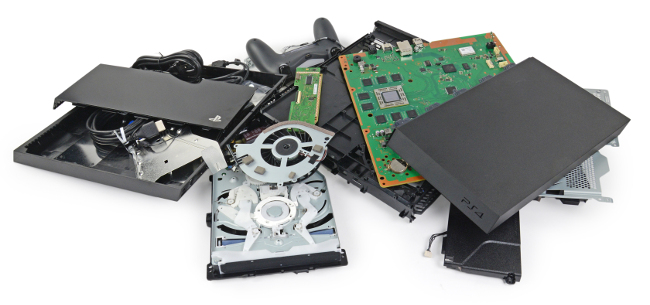Google Glass
A look at gadget happenings, as Google adds musical features to its Glass headsets, iFixit’s fixers tear apart a PlayStation 4 console, and UK lighting firm PhotonStar Technology introduces us to its circadian smart bulb system, Halcyon.
Music to Glass-wearers’ ears
Google last week confirmed a report from The New York Times that Google Play Music features would be integrated into Google Glass.
Rolling out to current Glass Explorers, these new features include the ability to listen to tracks from users’ Play Music library, as well as Google’s on-demand music-streaming services, All Access. Users can also search for songs playing in their environment using the Shazam-like Sound Search.
To incorporate music into the headgear, Google has developed stereo earbuds especially for the head-mounted display with five interchangeable colour caps. The earbuds are lightweight and engineered to allow users to listen to music while remaining aware of sounds from their surroundings.
These new features for Glass are demonstrated in the video below by record producer, engineer and DJ Young Guru.
Sony PlayStation 4 teardown
PlayStation fanboys would probably balk at the thought of getting their hands on a brand-new PlayStation 4 just to tear it apart, but that’s exactly what IT repairs website iFixit did with its next-generation console.
It’s all in the name of research, however, and the intrepid tinkerers have discovered that the modern gaming machine is both easy to open and repair-friendly, scoring an 8 out of 10 on the iFixit repairability scale.

Brownie points were earned for features like a user-replaceable hard drive, but taken away for lack of support for external USB storage, which limits the console’s potential as a dedicated media centre.
Halcyon smart bulb system
British LED lighting company PhotonStar Technology today launches its Halcyon smart bulb system, which claims to be the first whole-home circadian consumer smart bulb system.
While smart bulb systems like Philips Hue and LIFX already offer colour-changing, controllable lighting, Halcyon adds to this service with open multi-user functionality and circadian lighting.
Circadian lighting is thought to improve health and well-being by simulating natural light and is the system US space agency NASA uses on the International Space Station.
With Halcyon, home owners can control their lighting systems from a range of devices thanks to a web app, which PhotonStar believes is necessary to take smart bulbs beyond the phase of an early gadget and into the mainstream of general lighting.
With an open API, developers can also connect to Halcyon and do more with this system.
Halcyon is set to reach the general market in early 2014, but Kickstarter backers will receive early models in the next few weeks.
Stay informed – get daily updates on the latest happenings in technology directly to your inbox.